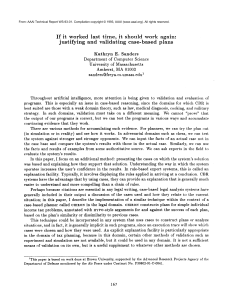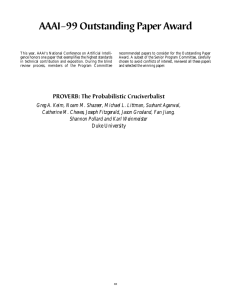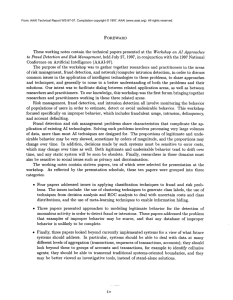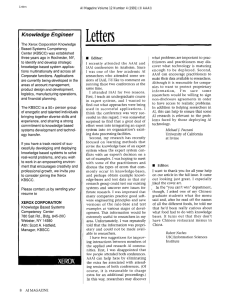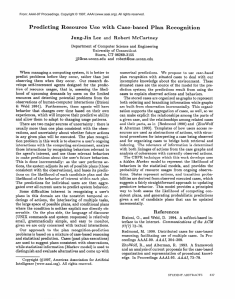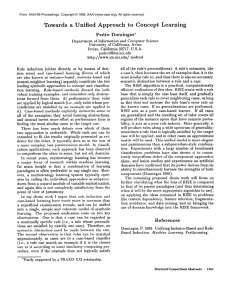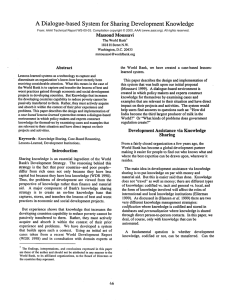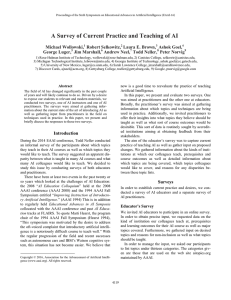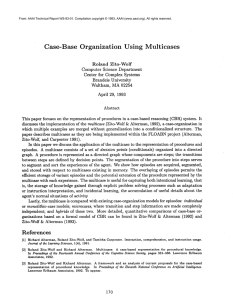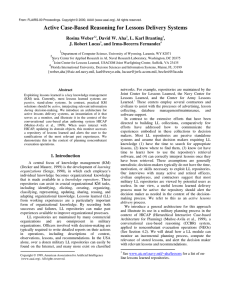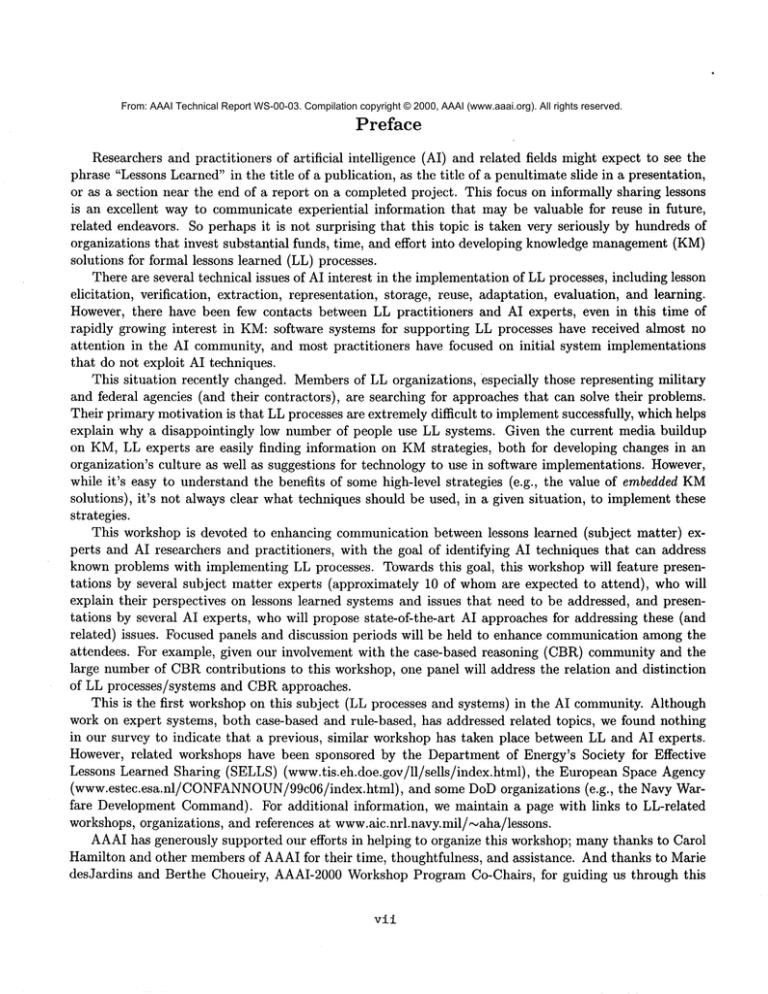
From: AAAI Technical Report WS-00-03. Compilation copyright © 2000, AAAI (www.aaai.org). All rights reserved.
Preface
Researchers and practitioners of artificial intelligence (AI) and related fields might expect to see the
phrase "Lessons Learned" in the title of a publication, as the title of a penultimate slide in a presentation,
or as a section near the end of a report on a completed project. This focus on informally sharing lessons
is an excellent way to communicate experiential information that may be valuable for reuse in future,
related endeavors. So perhaps it is not surprising that this topic is taken very seriously by hundreds of
organizations that invest substantial funds, time, and effort into developing knowledge management(KM)
solutions for formal lessons learned (LL) processes.
There are several technical issues of AI interest in the implementation of LL processes, including lesson
elicitation, verification, extraction, representation, storage, reuse, adaptation, evaluation, and learning.
However, there have been few contacts between LL practitioners
and AI experts, even in this time of
rapidly growing interest in KM:software systems for supporting LL processes have received almost no
attention in the AI community, and most practitioners have focused on initial system implementations
that do not exploit AI techniques.
This situation recently changed. Membersof LL organizations, especially those representing military
and federal agencies (and their contractors), are searching for approaches that can solve their problems.
Their primary motivation is that LL processes are extremely difficult to implementsuccessfully, which helps
explain why a disappointingly low number of people use LL systems. Given the current media buildup
on KM, LL experts are easily finding information on KMstrategies,
both for developing changes in an
organization’s culture as well as suggestions for technology to use in software implementations. However,
while it’s easy to understand the benefits of some high-level strategies (e.g., the value of embeddedKM
solutions), it’s not always clear what techniques should be used, in a given situation, to implement these
strategies.
This workshop is devoted to enhancing communication between lessons learned (subject matter) experts and AI researchers and practitioners, with the goal of identifying AI techniques that can address
knownproblems with implementing LL processes. Towards this goal, this workshop will feature presentations by several subject matter experts (approximately 10 of whomare expected to attend), who will
explain their perspectives on lessons learned systems and issues that need to be addressed, and presentations by several AI experts, who will propose state-of-the-art
AI approaches for addressing these (and
related) issues. Focused panels and discussion periods will be held to enhance communication amongthe
attendees. For example, given our involvement with the case-based reasoning (CBR) community and the
large number of CBRcontributions to this workshop, one panel will address the relation and distinction
of LL processes/systems and CBRapproaches.
This is the first workshop on this subject iLL processes and systems) in the AI community. Although
work on expert systems, both case-based and rule-based, has addressed related topics, we found nothing
in our survey to indicate that a previous, similar workshop has taken place between LL and AI experts.
However, related workshops have been sponsored by the Department of Energy’s Society for Effective
Lessons Learned Sharing (SELLS) (www.tis.eh.doe.gov/ll/sells/index.html),
the European Space Agency
(www.estec.esa.nl/CONFANNOUN/99c06/index.html), and some DoDorganizations (e.g., the Navy Warfare Development Command).For additional information, we maintain a page with links to LL-related
workshops, organizations, and references at www.aic.nrl.navy.mil/~aha/lessons.
AAAIhas generously supported our efforts in helping to organize this workshop; manythanks to Carol
Hamilton and other membersof AAAIfor their time, thoughtfulness, and assistance. And thanks to Marie
desJardins and Berthe Choueiry, AAAI-2000Workshop Program Co-Chairs, for guiding us through this
vii
process. Also, thanks to our workshop committee membersfor assisting with the reviewing process and
with planning the workshop. Thanks also to the Office of Naval Research, the Naval Research Laboratory,
and the University of Wyoming
for supporting our research on this topic. Finally, thanks to all the members
of the lessons learned community who encouraged us to organize this workshop, and to the participants
who have made this effort worthwhile.
David W. Aha & Rosina Weber
31 July 2000
Austin, Texas
viii



